Co-founder of Microbiome Labs Explains Why Spore-Based Probiotics Are King w/ Kiran Krishnan  Co-founder of Microbiome Labs Explains Why Spore-based Probiotics
Introduction – Spore-based Probiotics
[00:00:00] Detective Ev: Well, hello my friends. Welcome back to another episode of the Health Detective Podcast by Functional Diagnostic Nutrition. My name is Evan Transue, AKA Detective Ev. I will be your host for today’s show about specific spore-based probiotics.
We’re speaking with someone who needs barely any introduction. I am going to give him one, but he doesn’t really need one. You’ve definitely heard of this guy. If somehow, you have not heard of him, I know you have heard of the company. His name is Kiran Krishnan, and he is the co-founder of Microbiome Labs.
That’s MegaSporeBiotic, MegaIgG products that so many people in the functional space have come to love because this is a science-based company. They keep things clinically backed. They know what they’re doing, wonderful products. And if you are not in the FDN course yet, or you’re a trainee, really good news, we actually get access to them as practitioners.
That means we get significant discounts on all their products. You’re able to drop ship it to your clients for an upcharge, which is great. Microbiome Labs, the one thing I really like about them, there’s many things, but one thing in particular is that they don’t allow customers to come on their website and just buy products. They actually make them go through a practitioner.
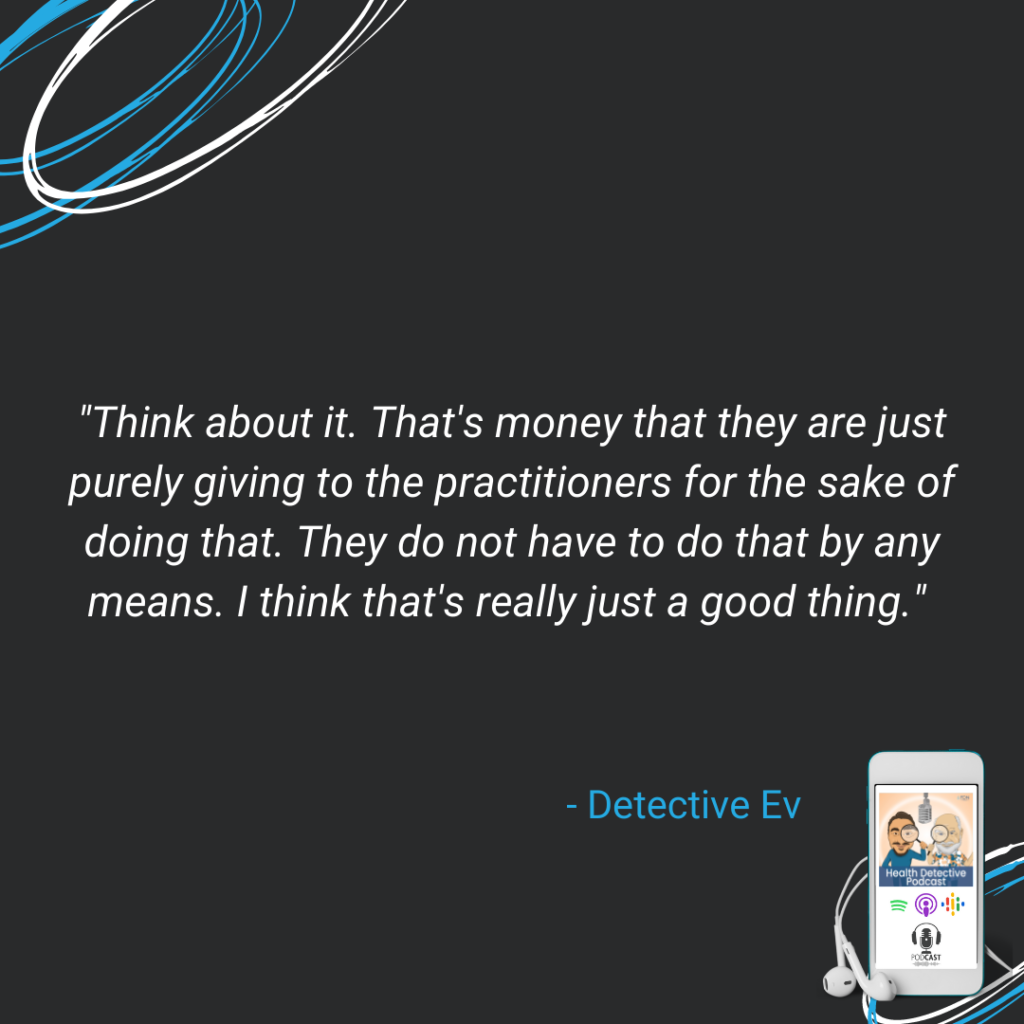
If I’m a consumer, not a practitioner, and I just want to buy these products, I would still have to find someone’s website or find someone near me. I think it’s cool that they do that. Think about it. That’s money that they are just purely giving to the practitioners for the sake of doing that. They do not have to do that by any means. I think that’s really just a good thing.
About Kiran Krishnan
I’m going to read a little bit about him, just a quick thing before we get into this episode. He is a sharp guy, wealth of knowledge. This is more me just taking notes the whole time. Not literally, but basically, I am doing that mentally.
Kiran Krishnan is a microbiologist who graduated from the University of Iowa. With a rich background in research, Kiran noticed that many supplement companies were lacking sufficient clinical data, which inspired him to design trials that were more affordable and fitting for the supplement industry. He then expanded his skillset into product development and formulation for a number of retail supplement companies.
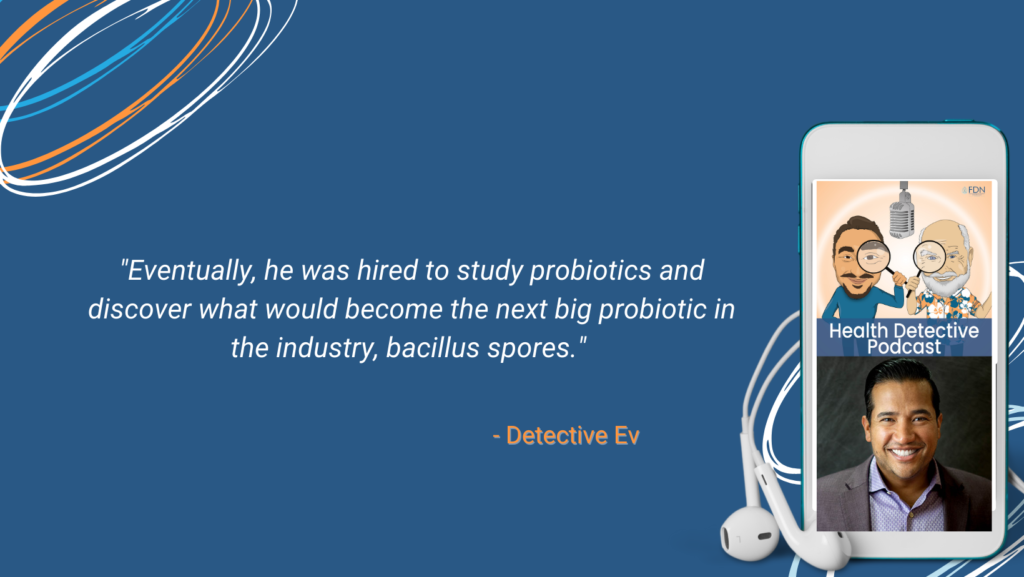
Eventually, he was hired to study probiotics and discover what would become the next big probiotic in the industry, bacillus spores. Before Kiran discovered the spores, Dr. Tom, who was the other founder of Microbiome Labs, took a step back from supplement manufacturing, and settled into his own chiropractic practice.
As his practice began to blossom, he found himself on the forefront of functional medicine, uniquely focused on his patient’s gut health. For years, probiotics had proven so ineffective and inconsistent that he eventually quit using them in his practice altogether. That is until he saw the research that Kiran had uncovered. And boom baby! Microbiome Labs was born.
It is a massive company. They have done incredible things. And we actually talk about the growth that they experienced as a business from the time that the first product was launched in 2013, until now. This is insane. Your results may vary, but it’s pretty impressive stuff.
Mom’s MegaSpore Spore-based Probiotics
I think you’re going to learn a lot today about probiotics in general and especially spore-based ones and why these are so effective compared to the stuff that we get at the grocery store or the health food store from the refrigerated section. Without further ado, let’s get to the episode.
All right. Hey there, Kiran. Thanks so much for being here with us today, man.
[00:03:03] Kiran Krishnan: It is a pleasure. Thank you for having me.
[00:03:07] Detective Ev: This is cool. In terms of just people making some real noise in the industry, I would say this is one of the bigger people that we’ve had on. And we’ve had some impressive names, I’m not lessening any of that. But I think I’m also biased, too, in a positive way. Because when you get into the world of FDN, for those that might be looking at the course or our trainees, Microbiome Labs becomes a huge part of what we’re doing.

I was laughing with Kiran before we started recording. I can’t even tell you how many times I’ve ordered from there. My mom gets a huge benefit from it. My mom, still to this day, Kiran, I’ve been in FDN for five years, will not let me not order her the MegaSpore because she will not use the bathroom otherwise. If she’s running out, she’ll do it like two weeks proactively. She’ll be like, hey, make sure you get that for me.
You guys are really doing cool things and it’s impressive what’s happening with these products. I think we have at this house right now, MegaIgG2000, MegaSpore of course, PyloGuard, and then MegaMucosa. We always just have some stuff here. So, thank you for what you’ve done.
FDNs are Brilliant
But before we get into any of that, only because we have a lot of trainees that listen, I know you do a ton of podcasts. I would love if we could just dissect some type of brief background from you. Again, some people are joining the world of FDN, they might actually not know who you are. They might know Microbiome Labs but haven’t gotten to meet you yet.
So, what’s your background and how did you even get into this company and get this started?
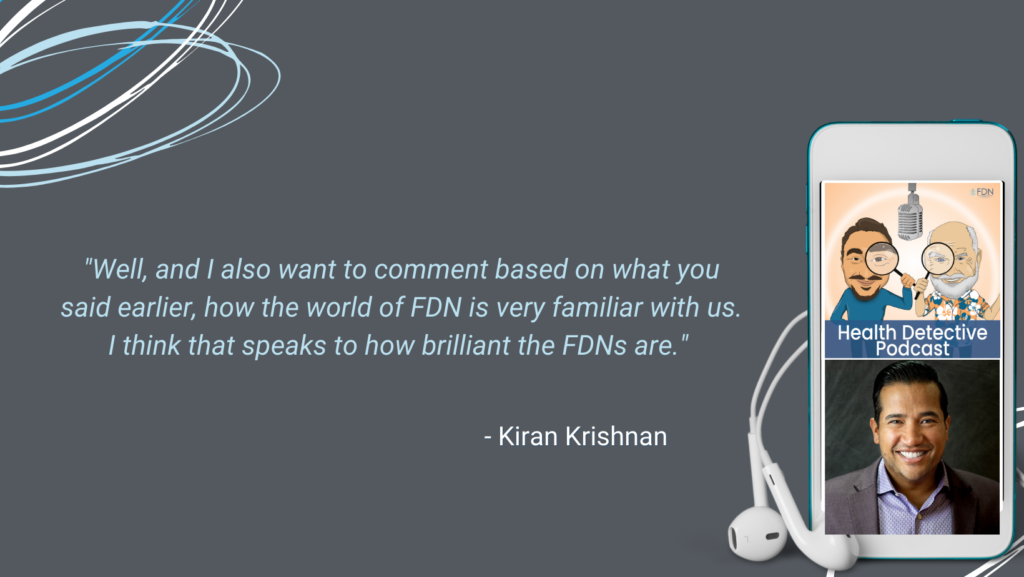
[00:04:19] Kiran Krishnan: Yeah, absolutely. Well, and I also want to comment based on what you said earlier, how the world of FDN is very familiar with us. I think that speaks to how brilliant the FDNs are. I have a lot of friends who have great respect for in the community that are FDN trained. They really go through a critical thinking process about health and systems biology. So, it’s always been easy for us to speak to the FDN community because we are a very systems biology kind of company.
My background is research microbiologist and my initial research work in the academics was around pathogenic organisms. I worked on listeria. I worked on E coli. We looked at swarming and mutated E coli and so on. That kind of starts to become the world of clinical microbiology, where you really focus in on pathogenic organisms. That’s the most interesting area. That’s the area that you can get most grants on and so on. It becomes easy to make a career that way.
Looking at Positive Commensal Organisms (Spore-based Probiotics)
One of the things that always bugged me about it was that all of this focus we put on these few pathogenic organisms causes us to negate the trillions of bacteria that are either non-harmful or beneficial. That’s just the world of clinical microbiology, clinical pathology, where you start looking at only the negative things.

I always wondered about what are the influences of these other commensal organisms and the ones that don’t actually cause infection, which make up 99% or more of the bacteria that we encounter. Fortunately for me, the human microbiome project kicked off back in 2005, 2006, which was great timing because I was really looking at kind of shifting my expertise within the world of microbiology.
I very quickly dove into the world of microbiome research with the whole focus of, number one, trying to understand the microbiome and how it either conveys health or drives disease. Number two, what can we do about it? What are the tools we can develop and possess in order to modulate or influence the microbiome in such way that it helps and provides a health benefit to an individual? That became the origin of the company back in 2012.
We basically mapped out a course that we would take from a clinical perspective on how to look at health problems, big and small. So, we became very focused on big problems with the first one being leaky gut. Then we launched a company with a goal of resolving leaky gut because it became very clear, even then, that leaky gut was an underlying driver of most of the chronic health conditions that we see. If you don’t resolve your leaky gut, it makes it very hard to make progress on these conditions. That’s the origin of the company.
Nonsense in the Probiotic Industry (Not Spore-based Probiotics)
Fortunately for us, we’ve stuck to our guns of letting research drive the bus, investing heavily in science so that we properly understand our products, properly understand how they work. We can actually utilize science to identify gaps in therapeutics so we can fill those gaps and create new things that really will help people get better.
[00:07:35] Detective Ev: I think out of all the things you just said, I think the most amazing part, this wasn’t known to me, so you only started this in 2012.
[00:07:42] Kiran Krishnan: Yeah, we did. The first product launched in 2013. We’re on our ninth year. We’ve scaled very quickly and we’re actually a very grassroots company. We never took investments, were never VC or private equity backed, and didn’t have any big investors.
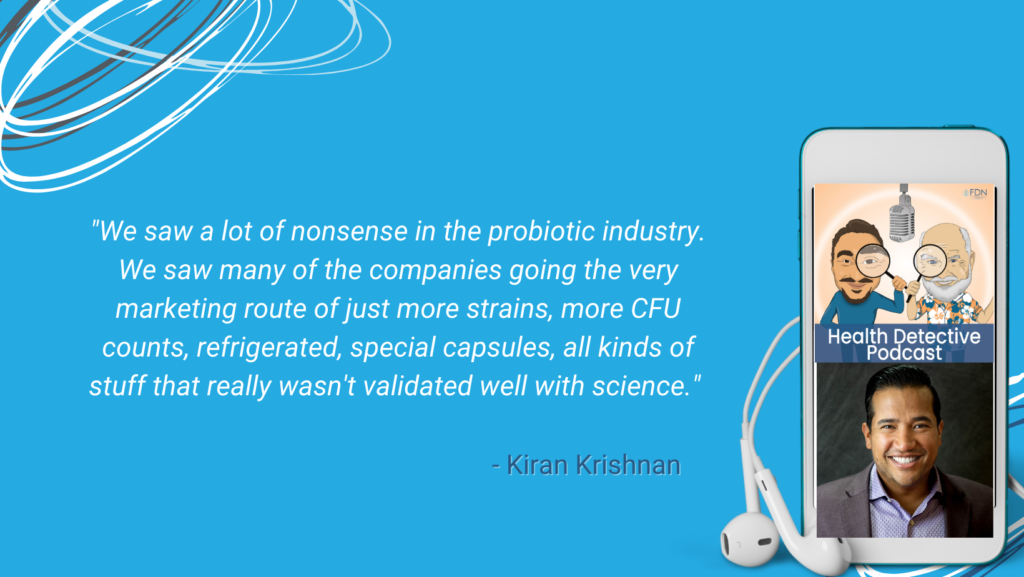
So, we started the company with $80,000. That’s all we had in 2013. By the end of that year, we had almost burned through most of it. But our mindset was that this was needed so badly. We saw a lot of nonsense in the probiotic industry. We saw many of the companies going the very marketing route of just more strains, more CFU counts, refrigerated, special capsules, all kinds of stuff that really wasn’t validated well with science.
And none of these supplement companies were doing research on their products. They weren’t studying the probiotics or anything. They were just kind of assembling random products and putting them out there in the marketplace. So, we truly felt that there was a need and we felt that health practitioners would feel that need more than anyone else because you guys have the skillset to vet products and to really understand do they work or not.
Sharing the Good News about Spore-based Probiotics
It’s different than going after a consumer that’s walking through a big box store and just grabbing a probiotic gummy, that’s $10 bucks. We knew that our marketplace was health practitioners. That we could illuminate for healthcare practitioners the gaps that currently exists in how people are developing and utilizing probiotics.
We also knew that if we focus on science, that we would be successful, even though we stumbled a bunch in the beginning. So, we just stuck to our guns and sure enough it grew. What was beautiful about it is by 2017, so this is by the fourth year of being in business, what we started to see was an incredible surge of new practitioners that were coming on signing up for accounts and buying and utilizing products.

We survey them every time someone comes in and sets up an account. Eighty-seven percent of the practitioners that set up an account starting that year, said that they heard about us through a colleague. Not through advertising or any of that, cause we didn’t really have the budget to do any advertising or anything.
That was the magical moment to us. Because we were like, okay, we’re putting out good stuff that seems to help people and that’s why practitioners are talking to each other about it. As you know, being a practitioner yourself, inevitably you find something that works, you’re going to tell your colleagues about it.
Ultimately, the goal of all practitioners is to help people, right? You’re not competitive about it. You’re not like, ooh, I have this little secret that cures or deals with this disease. I’m not telling anybody. Inevitably practitioners share that information. That became an amazing aspect to the growth of our business.
FDNs Want Everyone to Get Well
[00:10:26] Detective Ev: Awesome! That’s certainly not true in the functional space, thankfully. I think one of the jokes that we always make is that one of the best things that could happen is that we go out of business. Now, we’re nowhere near close to that, unfortunately. The truth is it’d be great if we didn’t need all of this stuff.
It’s insane to me to think about it sometimes. Cause I’m a guy, I think I’m reasonably intelligent, but I’m not a guy with some advanced college degree in relevant areas like medicine or whatever. Yet, people are coming to me with 10 years of health issues to get help. That’s cool and it’s a privilege, but I don’t want that to be the world.
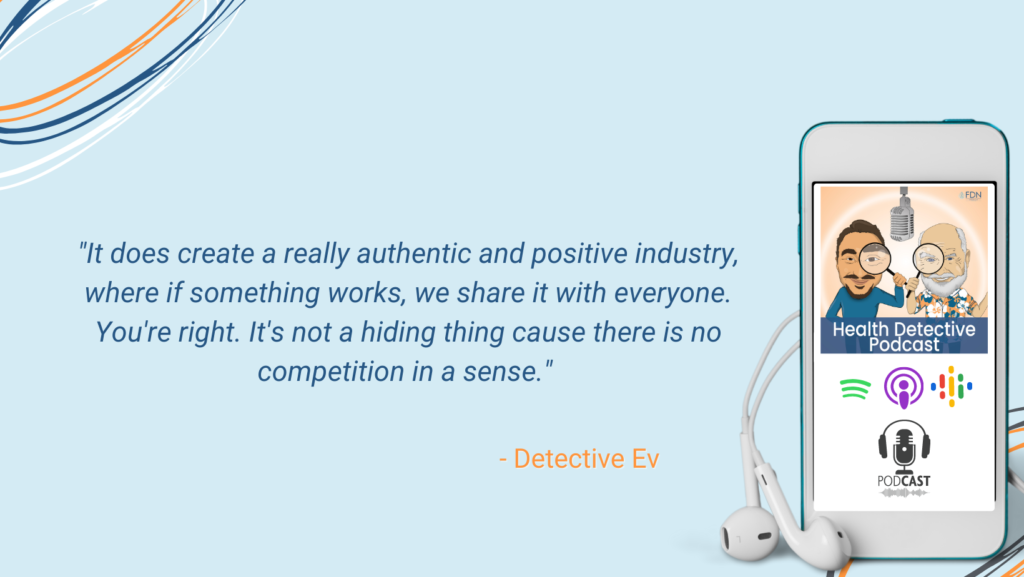
I want you to be able to go to the dang doctor, your family doctor, and actually get help for your chronic issues. It’s amazing what we get to do, but then at the other side, it’s like, wow, all right, this really shouldn’t be happening. It does create a really authentic and positive industry, where if something works, we share it with everyone. You’re right. It’s not a hiding thing cause there is no competition in a sense.
Now that I know when you guys actually launched the first product, it’s even more impressive to me. I’m sure you guys expected it to do well, otherwise you wouldn’t have started the company. But my God, I mean very few people could probably predict that, I’m assuming.
[00:11:23] Kiran Krishnan: And to be frank, neither Tom, who’s my business partner, or I had built a product company at that point. We’d actually had other companies, but mine was in the research world and developing ingredients and so on.
Marketing Stubbornness Pays Off
Then I had a number of consulting things that I was doing. He was actually doing kind of distribution to other healthcare practitioners from his time working in Europe as a functional medicine doctor. He started importing some products from Europe because they really helped his practice in Europe.
But neither of us had ever created a brand product and put it out in the market. I would definitely say we didn’t really know what we were doing, but we just were driven by this like belief and passion. And one of the adages that we stuck with that I think has helped us a lot, is we wanted to be disruptive, and we wanted to do it differently than other companies in our space did, starting of course, from just the principles alone around focusing on the science. That’s one thing.

The second part of it is like, anything that any marketing expert told us that we talked to during that time, we actually did exactly the opposite. You know, we would actually take interviews from marketing experts just to see what they say so that we could do the exact opposite. We were so stubborn that way, but it worked.
For example, the name of our flagship product, the probiotic MegaSporeBiotic, we had talked to at least three marketing groups when we were starting. We were like, we might need a marketing branding agency to help us. Every one of them said, I understand your cool technology and all that, but whatever you do, don’t say the word “spore” in anything. They’re like, people are going to think mold spores or anthrax spores, and you’re going to kill your brand before you know it.
Scary and Colorful, Inviting the Discussion
We were like, we’re going to call it MegaSpore. The biggest scariest spore you can think of. So, we did exactly the opposite of what all the marketing experts, because, you know, we’re like, we want to invite the discussion. I want some doctor looking at me like I’m crazy going, what is this MegaSpore you’re selling? You know, that gives me a chance to talk to them. We were very disruptive. We did exactly the opposite of what all product and brand experts would say.
Colors as well. We went to a couple of these shows where, you know, healthcare practitioner companies exhibit. What we noticed was all of them were trying to go more farmer looking. White with just blue labels and just very clean look. Our first booth and product was pink and orange and just like every loud color you could imagine.
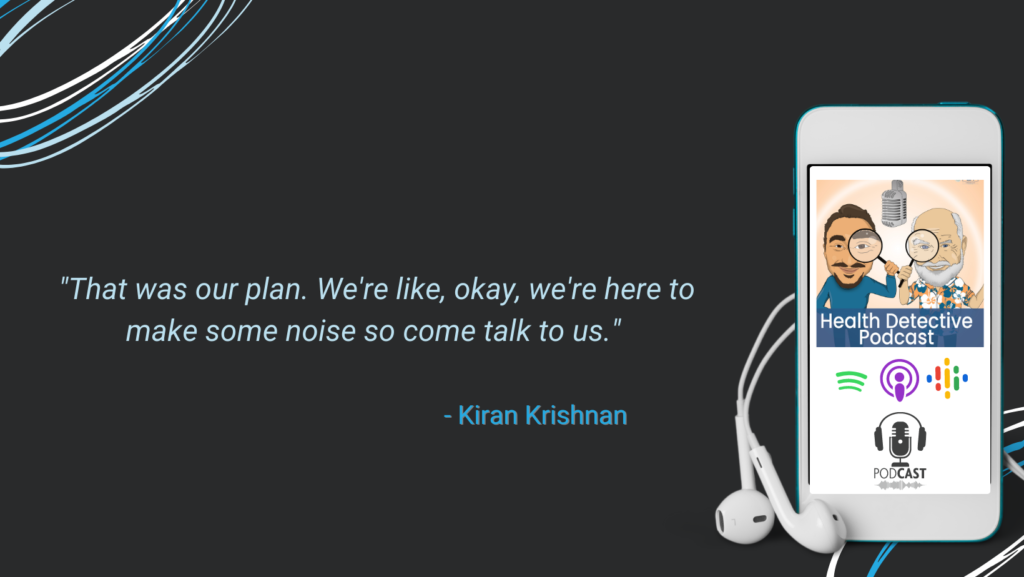
So, here are these two guys that were, you know, unknown in the marketplace at that time, standing there in front of this big pink, orange, bright booth that says spore all over it. That was our plan. We’re like, okay, we’re here to make some noise so come talk to us.
[00:14:02] Detective Ev: It must be amazing being one of those marketers that were on these meetings. Then like maybe months down the road, they get a Facebook ad or, well, not a Facebook ad in your case, but you know what I mean? Where it just says MegaSpore!! It’s like, all right, these guys are jackasses. But hey, it worked for you. You guys have done an amazing job.
Starting Off with the Basics on Spore-based Probiotics
And that’s where I kind of want to transition because, Kiran, I also know that you can get incredibly technical because you’re a pretty advanced guy. You’ve been doing this for a while, and I’ve seen some of your lectures. I was at that March Biohacking Congress. So, I know how far we can get this.
My goal today as the host is just trying my best to really know who’s listening in our audience and serving them the best. I hate for you to have to tone anything down, but it seems like you’re pretty passionate about it, regardless, which is a good quality to have. Probably a reason why the business is doing so well.
I just want to start with some of the basics for our trainees or people potentially looking into the FDN course, like what makes MegaSporeBiotic different? Why is this different than the stuff I can go to at my health food store, where I see a hundred CFUs (which is colony forming units, for those that don’t know), and it’s got to be refrigerated and it’s going to cost me $70 bucks or whatever it might be. How is this different?

Because I think a lot of people, even as my clients were thrown off, they’re like, okay, I have to spend like $55 bucks. I don’t have to refrigerate this, and I can just carry this around and it’s going to be like the best one I can do? I’m like, I promise you, yes.
So, I’d love to hear, why is this different and what are spore-based probiotics? I’ll throw that in there as well.
What Spore-based Probiotics Are
[00:15:21] Kiran Krishnan: That’s a very important question. Let’s tackle the second one first.
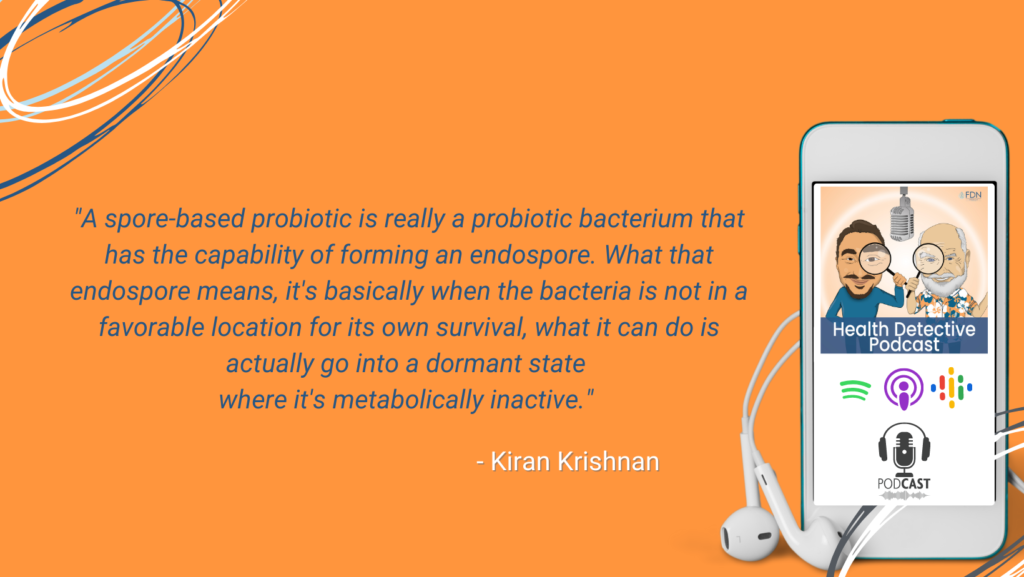
A spore-based probiotic is really a probiotic bacterium that has the capability of forming an endospore. What that endospore means, it’s basically when the bacteria is not in a favorable location for its own survival, what it can do is actually go into a dormant state where it’s metabolically inactive. It basically shuts down all systems. Then it wraps itself with a protein calcified armorlike coding to protect the cell structure. It becomes this like impenetrable little ball, little armored ball, that is just sitting there. And it can sit there indefinitely until the situation becomes more favorable.
The genius of vector that we work with is called bacillus. If people aren’t familiar, all bacteria are classified as a genus and a species, right? So, like, lactobacillus acidophils, acidophilus is a species. Lactobacillus is a genius. In this case, bacillus is our genus. The oldest bacillus endospore that has been found was found in Southern California, actually, in the salt crystals, in a cave.
Scientists have been going deep into caves that have never been touched. The reason they’re going deep into these caves is they’re looking for molecules that may give them ideas or act as new antibiotics. Because as we develop more and more antibiotic resistance, we have to go look for new ideas. Of course, the first antibiotic came from an organism from penicillium. And so, we look to the microbial world to understand how you produce antibiotics because bacteria make antibiotics all the time.
Finding Historically Old Bacillus Endospores
They’ve been going to these deep recesses of these caves looking for new microbes to see if they contain any antibiotic capabilities. One of the classes of bacteria that they found in the salt crystals was a bacillus. They dated the bacillus to over 250 million years old. It was basically suspended in the salt crystals. Because under that high sodium concentration where the bacillus got trapped, it’s not a favorable growth environment. So, it went into its spore state and got suspended there. They were able to remove it from the salt crystal, dissolve it out, and still played it. It was still alive at 250 million years old.
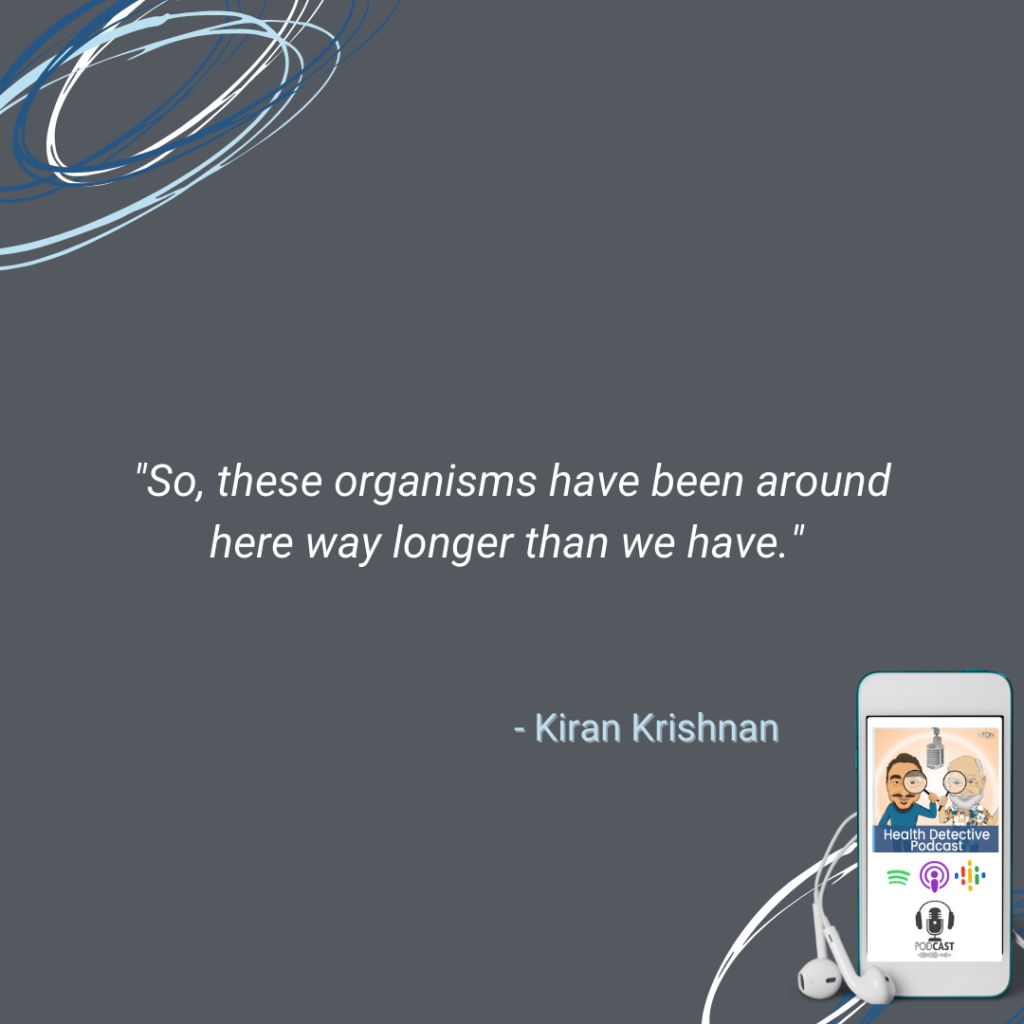
The other one was actually in the digestive tract of an ancient, fossilized honeybee. The whole bee was fossilized in amber. They were able to pull out particulate matter from the digestive tract. One of the things that they pulled out was a bacillus endospore that they were able to still grow, that was 50 million years old. So, these organisms have been around here way longer than we have. And in fact, there is some evidence that maybe these organisms were the origin of cellular structure on earth.
There’s this theory called Panspermia. Panspermia speaks about the seeding of earth with basic cellular structures like nucleic acids, DNA, RNA proteins and so on. The idea is that some of these building blocks of cells have bombarded the earth during the area of heavy meteor showers, where meteorites contain these kinds of cellular structures. They’ve measured this on meteors where you can take meteorites that crash into earth, and you can look at them. They happen to have cellular structure components on them. They’ll have DNA, RNA, and so on.
Bacillus Subtilis are Ubiquitous and Adaptable
Then they started looking at what organisms that exist today could have made an interstellar journey, have enough stability through the vacuum of space to actually seed cellular life on earth. Then they took bacillus endospores into space for seven years as a research study, outside, in the vacuum of space, in the cold vacuum of space. They were able to survive interstellar journey for seven years.
These are amazing space microbes that have been on this earth probably since the origin of earth itself and billions of years before humans ever came along. They’ve been here, they know the rules, they wrote the rules on cellular communication. So, why did we hone in on them or what makes them different?
What’s really interesting about them is that when you find the right type of bacilli (and they’re not all the same), you can find a bacillus subtilis, for example, that doesn’t really do much as a probiotic, even though it’s a bacillus subtilis because it’s adapted for different environments.
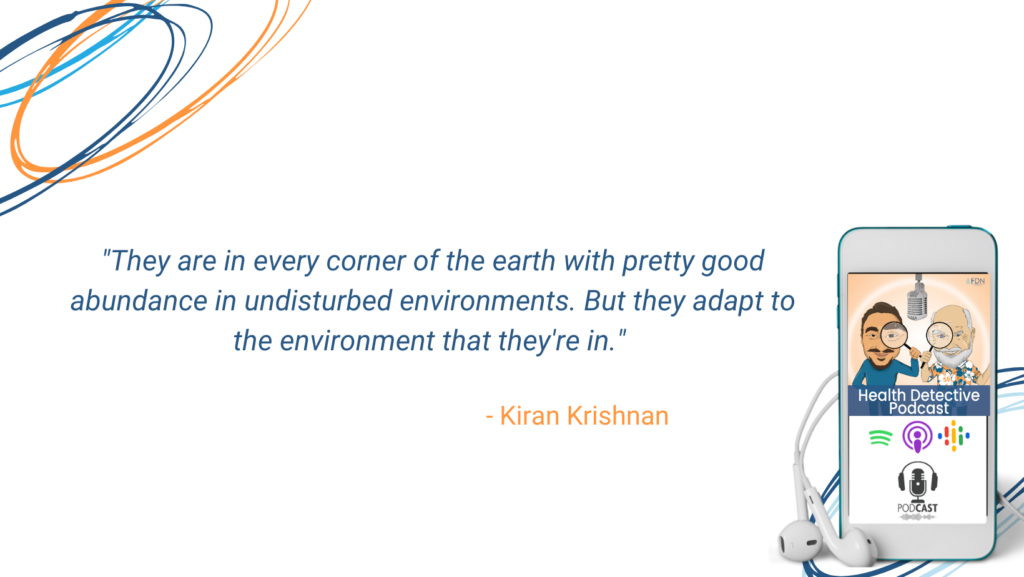
These organisms are pretty ubiquitous. They live on every corner of the earth. They found them in glacial ice cores in the Tibetan plateaus, in glacial ice cores in the South Pole, in the North Pole, in every corner of the earth with pretty good abundance in undisturbed environments. But they adapt to the environment that they’re in.
When you find a bacillus that’s in a remote environment like that, it’s not necessarily going to function as a probiotic in your GI tract because it doesn’t know the human GI tract. It hasn’t had the millions of years of co-evolution with humans to understand the GI tract.
Spore-based Probiotics Can Survive the GI Tract
But when you do find a bacillus that has that, a bacillus that has been going and cycling through the human GI tract for millions of years, what you find is an organism that has developed a certain level of intelligence to understand better what a balanced microbiome looks like in our GI tract. Then we can understand, right?
And the reason for that is this occurs through a process of symbiogenesis. Symbiogenesis is the forced symbiotic development of organisms that, through geographic or other forces, are forced to coexist in the same environment. Over time, what tends to happen when you force different organisms together, they find a way to work things out because everybody wants to survive.
So, when we evolved as a species, we kept consuming organisms inadvertently because we ate off the land. We ate dirt, drank water out of rivers and streams, killed animals and ate their guts, all kinds of stuff. Dug for roots and tubers, so we got huge amounts of exposure to environmental bacteria.

The vast majority of those environmental bacteria do not survive through the gastric system because the gastric system is designed to kill microbes. But the spores with their armorlike coating have an incredible way of surviving through this digestive tract. So, as they’ve survived through, we’ve allowed them to actually inhabit our GI tract with an exchange that they police and monitor the GI tract if they’re given a chance to survive in there.
Spore-based Probiotics – Nature’s Probiotics
Over time, our constant consumption of bacillus endospores from the environment has created some of them to develop this probiotic like function, where, when we consume them, they go in the gut, they protect the gut, they read the microbial environment, they do a bunch of amazing things that we’ll talk about. At the end of the day, we poop them out in a couple weeks, they go back in the environment, and they look for their next host. That’s the origins and history of bacillus endospores.
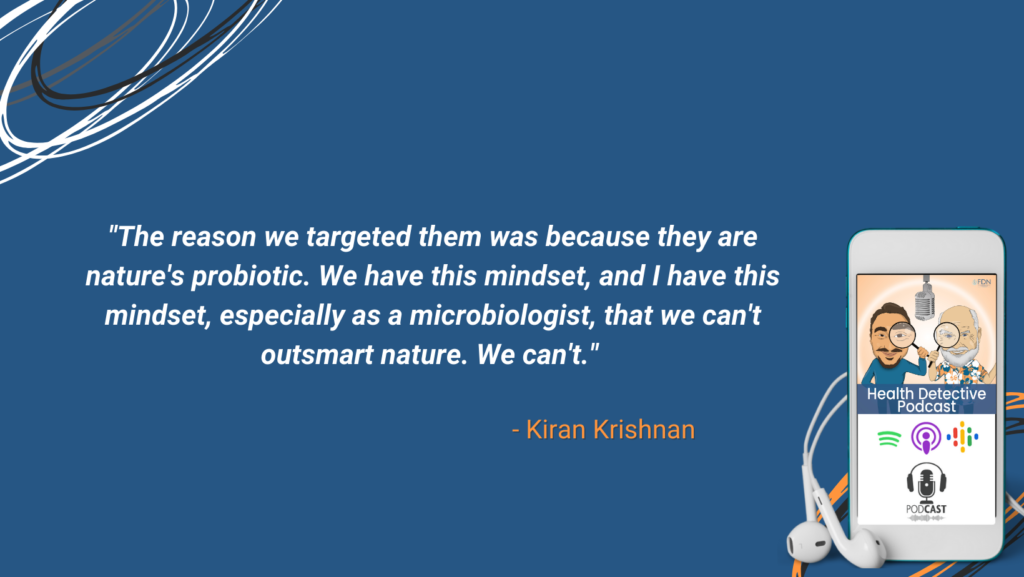
The reason we targeted them was because they are nature’s probiotic. We have this mindset, and I have this mindset, especially as a microbiologist, that we can’t outsmart nature. We can’t. That’s what synthetic chemistry and pharmaceutical approaches have been trying to do for hundreds of years. They’ve been trying to outsmart nature.
Just look at baby formula. Since the late 1800’s, these companies have been spending billions of dollars to try to develop baby formula that mimics mother’s milk. They still can’t do it. You cannot mimic mother’s milk biologically. It’s got over 200 different oligosaccharide prebiotics in it, hundreds of different species of probiotic bacteria, a nutritional composition that we can’t recreate despite the 110 years we’ve been working on it with some of the biggest biotech and science companies in the world. We can’t imitate mother nature in that way.
Our philosophy is we can’t outsmart nature. What we should do is try to identify what nature has already created for us as a probiotic or a prebiotic. Study it, understand how it works, and then utilize that. That’s why we hone in on the spores. Because to us, they are mother nature’s probiotic that’s been here for millions of years.
Commercial Break – Try the FDN Course for Free
[00:23:48] Detective Ev: What’s going on, guys. It is Detective Ev here popping in really quick. If you’re listening to this episode thinking, wow, I would love to go help people do functional medicine stuff. I would love to have access to discounts on wonderful products like the ones offered by Microbiome Labs. Well, I got good news for you, you’re listening to the right podcast.

What you want to do is go to fdntraining.com/tryfdn and you’ll be able to try the FDN course completely for free no credit card required. That’s fdntraining.com/tryfdn to try the course completely for free. Then when you’re ready to sign up, you just let us know and we’ll get you enrolled. That’s fdntraining.com/tryfdn.
Okay, back to the episode.
A Seemingly Smaller Amount of Probiotics
Detective Ev: Wow! You got it going on, man, with the speaking. I can’t believe that you have the ability for both. Well, normally it’s a tradeoff. I can speak, but the level of research that you do would not be my thing. Then I have a brilliant chemist friend, who could do research all day, but he doesn’t necessarily have the gift of sharing that information. Him and I would have to be a team, you’re a combo package.
[00:15:21] Kiran Krishnan: Thank you.
Detective Ev: Very cool.
It was a great buildup for that, because all those things from the space to finding this 250 million years ago, it really does build up to the resiliency of the things that you guys are choosing to use, the strains you’re choosing to use, and why they’re in these products.
Just so I can play kind of devil’s advocate, and I’m not going to mention any product names. When I go to my health food store, I could go to their fridge and they’re going to have all these probiotics. I’m sure that a lot of those companies did research and they’re not trying to waste money. They’re certainly not trying to hurt people.
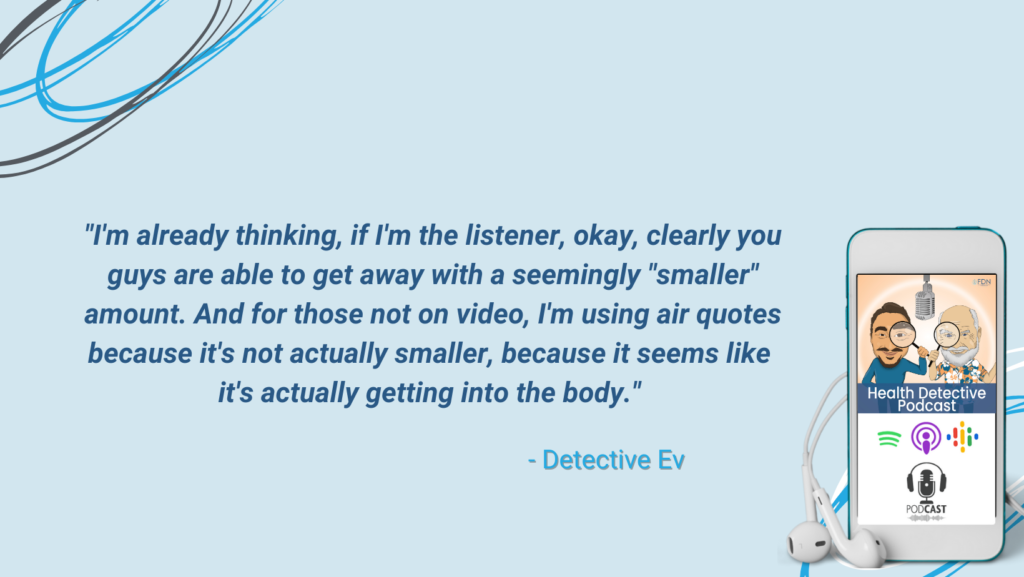
But they have to put in like again, like a hundred million CFU, you’ll see this in stuff. It’s like, wow, that’s incredible. Whereas you guys have such a smaller amount. I’m already thinking, if I’m the listener, okay, clearly you guys are able to get away with a seemingly “smaller” amount. And for those not on video, I’m using air quotes because it’s not actually smaller, because it seems like it’s actually getting into the body.
Do they have to use these mega doses because so much of it’s being killed off?
Fighting for Market Share
[00:25:38] Kiran Krishnan: That’s exactly right. I’ll give you a little bit of insight onto product development in many of these companies. Because prior to starting Microbiome Labs, I was a scientific consultant for many companies in our space where I would actually help them develop products or advise them on developing products.
This is how it normally goes. And keep in mind that most supplement companies out there don’t have a scientific team within the company. Most supplement companies are marketing-based companies. They’re driven by marketing people. And they’re founded by marketing people.
So, they don’t have in-house science groups and they work with people like myself to try to help them, support them on the science. The vast majority of companies, I think, mean well. There are some companies that are pretty egregious and are really just trying to make a buck.
They are out there, but even the companies that mean well. here’s how they go about it. It’s really marketing that drives their formulation work. I’ve sat in meetings before where a company’s talking about the next probiotic they want to develop and they’ll go, okay, we want 50 billion CFUs and 17 strains. That’s their target.

Then my first response is going to be why? Like, how did you come up with 50? And why 17? Like, what is that arbitrary number? Then the reason is because the company that they fight for market share with, whether it’s on the shelf or online, has, 11 strains and 30 billion CFUs. So, they want to be a little bit more than them.
Study the Finished Product
They want to position a potency claim over their competitor, but they want to be at the same price point. Now, because they’re trying to be at the same price point as 10 strains or 12 strains at 30 billion CFUs, they actually have to get lower quality strains because the price per kilo goes down. Which means you can do 50 billion at the same price of 30 billion. That’s how the conversations go.
The more sophisticated companies will say, we want to put in at least two or three research strains so that we can speak to some sites. My response has always been, that’s good. I love that they’re looking at strains that have some research on them. But I also explained to them that you can’t necessarily take 2, 3, 4 strains and have research separately on their own. Combine them together and then throw in a couple other ones to get to 17, 18, 20 strains and assume they still function the same.
Because this is not a small molecule. It’s not like a vitamin, it’s not a magnesium. This is a living entity that has thousands of genes that makes millions of proteins. It changes how it behaves based on its environment. If it’s mixed up with seven other strains or 10 other strains, it’s likely going to behave differently than when it was by itself.
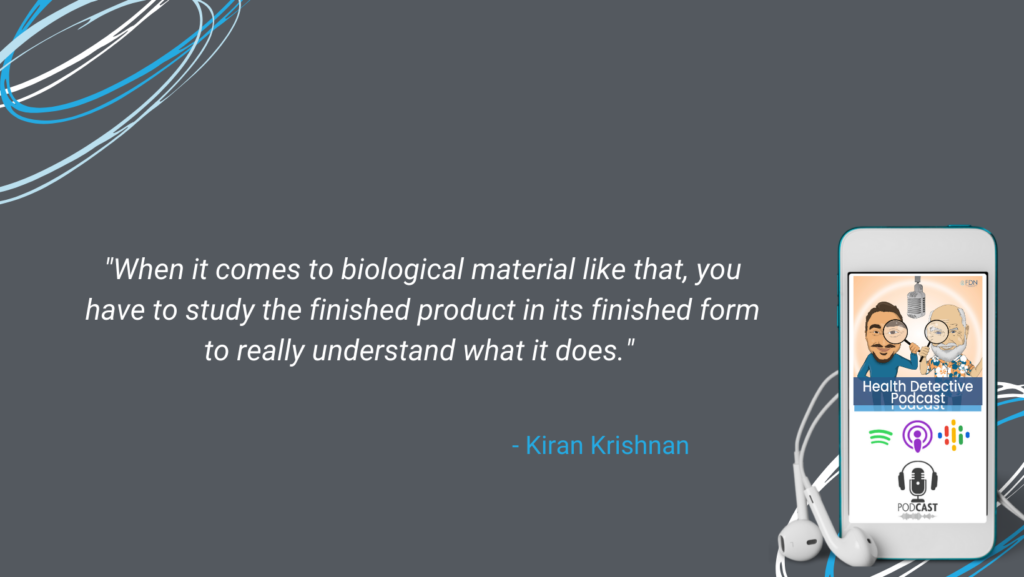
For that reason, it’s a big leap to go, this strain has some research, that strain has some research, let’s mix the two of them together, add a few more things, and then say, this is a research-based product. It’s not. When it comes to biological material like that, you have to study the finished product in its finished form to really understand what it does.
The Idea of Refrigerating Probiotics
Then the whole idea of refrigeration. One of the projects that actually kicked my world off into the world of probiotics, this was prior to starting Microbiome Labs, I think it was 2010. I had a research company. We had a big multinational companies approach us to ask us to help guide them in development of probiotic, actually.
They were looking for us to do research on other products, competitive products to see how they are positioned in the marketplace, because they were confused. They were like, do we do refrigerated, non refrigerated? Do we do a hundred billion CFUs? What dose do we go after? They were actually trying to understand the science aspect of it.
So, one of the first things I started doing is going to health food stores to try to get recommendations from the clerk. Like, what would you take if you were trying to get a good probiotic? They would always point me towards a refrigerator. I kept thinking to myself, like why are these bacteria in the refrigerator? It doesn’t make sense.

Then you start digging into it. You call the companies. Come to find out that the reason they’re in the refrigerator is because the CFU counts drop from the label claim as they sit on the shelf. And some of these companies got sued by class action lawyers who would just go and pick up the product from the shelf, test it, and go, haha. The label says 50 billion, there’s only 20 billion. You’ve sold this in 25 states. Here’s a class action lawsuit for false advertising and blah, blah, blah. Then they’d have to settle out of court for millions of dollars.
No Good Scientific Rational Behind These Other Probiotics
These companies said, okay, we’re going to put way more than 50 billion if that’s the label claim, and you put it in the refrigerator. It’ll maintain the CFU count through the end of shelf life. That’s the only reason to do it. But that also indicates that those bacteria at the comfortable temperature of 70 degrees, which is the room temperature, they’re dying pretty quickly. Then the question I asked, what happens when you put it in your body at 98.6 degrees? Does it have any chance of survival at all?
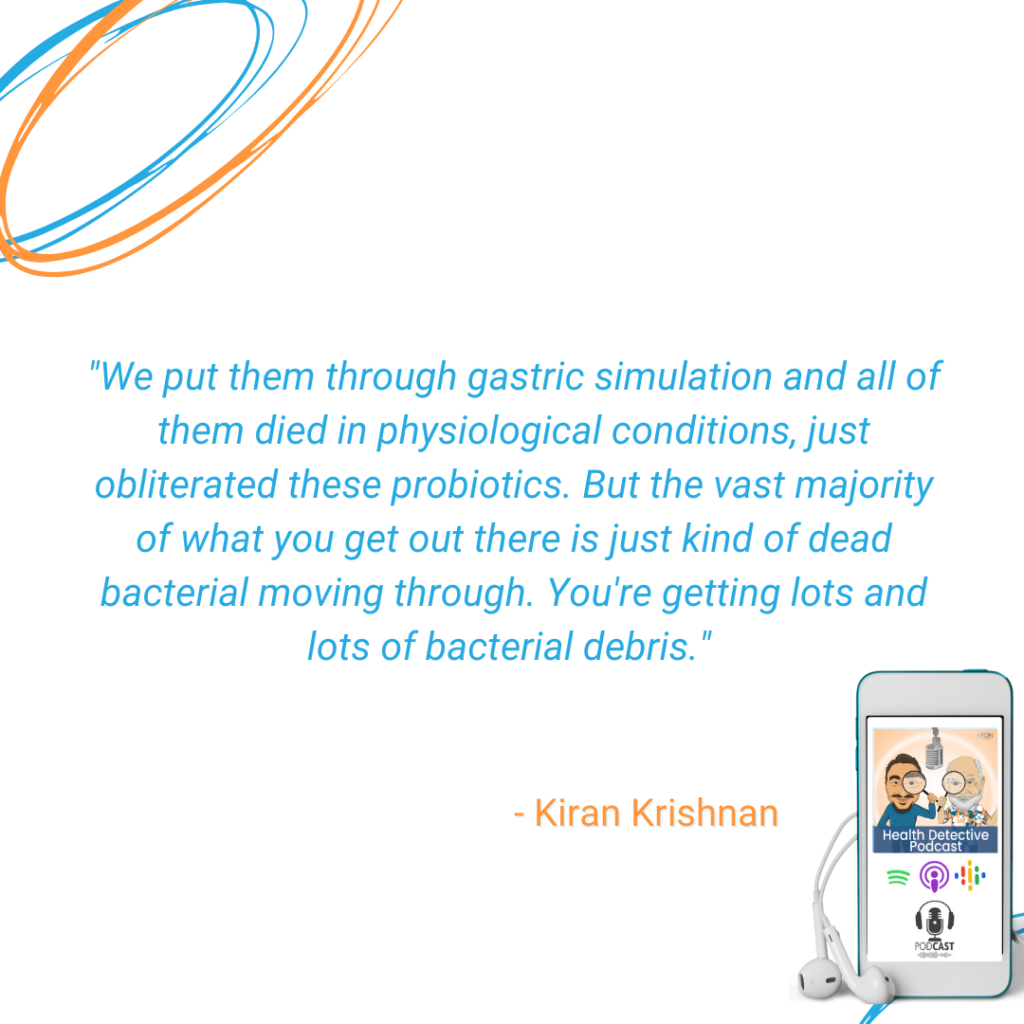
Sure enough, one of the first things we did for that research was we took 40 of the top retail provided product and we tested them. We put them through gastric simulation and all of them died in physiological conditions, just obliterated these probiotics. But the vast majority of what you get out there is just kind of dead bacterial moving through. You’re getting lots and lots of bacterial debris.
So, the dosage that they’re claiming is completely nonsensical. It doesn’t matter if you go to the retail store and you buy a 20 billion product or a hundred billion product, or a 200 billion product. None of those have any real good scientific rationale behind them.
You know, most probiotic studies, if we look at the literature, are done on single strains at 2 to 3 billion CFUs. That’s a vast majority of literature. Very, very little has been done on 50 billion or a hundred billion or more than that. So, it’s really marketing, unfortunately. And that was part of our impetus of coming into the market.
We’re Done with the Sleazy Salespeople
[00:31:32] Detective Ev: It’s sad to me that this is still a thing. I think this comment would be well received by this community. I’ll word it as, I think there’s a shift in consciousness happening right now, where people are done with the sleazy salespeople. They’re done with getting shrewd by companies, and good really is prevailing. It worked for you guys, it’s worked for FDN, where you stay the course, you sell something legitimate.
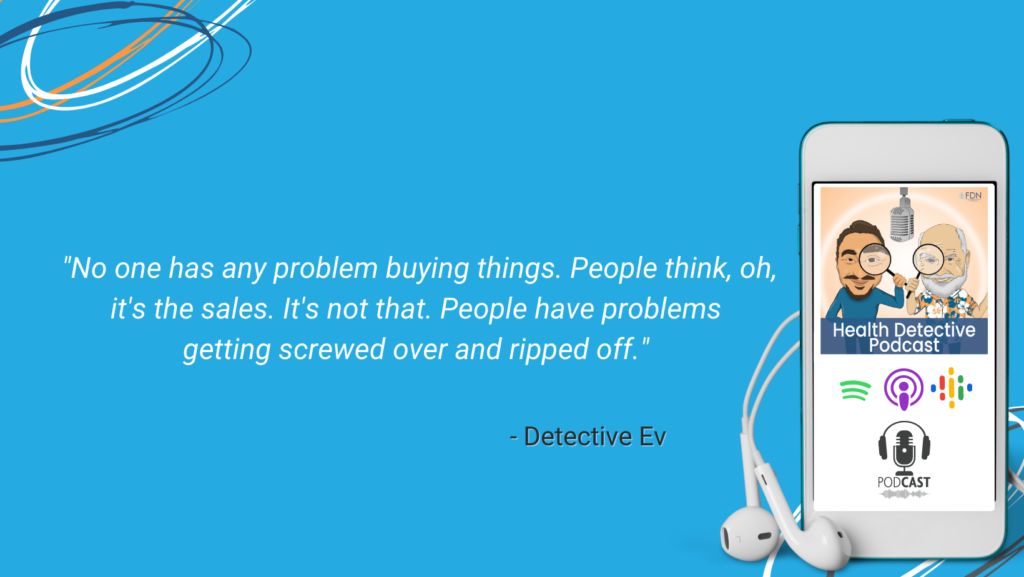
No one has any problem buying things. People think, oh, it’s the sales. It’s not that. People have problems getting screwed over and ripped off. They don’t have a problem giving you your money. We give people money every single day, multiple times, usually. It’s about what am I getting for this transaction?
I’m glad that there’s companies like yours out there. Hey, maybe we won’t have the hundred billion CFU thing and look all fancy, but we’re doing the right thing. It speaks for itself. Because what was it? Eighty-something percent of these initial sales were coming from people talking to colleagues. You can’t beat results. If something’s working consistently, I mean, the reason that you guys continue to get an order every single few months, cause she gets the big one, from my mom, is simply because she knows how well this works and feels it in her body still to this day.
This is someone, you know, ton of antibiotics got her thyroid removed. So, she really benefits from these things here, and it’s cool that she has access to it. Before we knew better, eight years ago, we were going to that health food store and buying this stuff and it was kind of a hit or miss.
Practitioner Accounts with Microbiome Labs
Like I think that did something. You buy it the next time. I’m like, this isn’t doing anything. Okay, let’s get it again.
But now this obviously makes a difference.
Wow, man! You’re like a two-podcast guy. You’re a wealth of information.
I want to make sure, at least get to the main stuff today, that’s going to affect, again, our practitioners. One of the things I think is most ordered by the people in our space is something you guys called the Total Gut Restore. It’s a no brainer for those listening. I mentioned this in the beginning, but just to be clear for the trainees, when you graduate from FDN, you are going to have a wholesale account, basically, with Microbiome Labs. You’re going to get discounts on this stuff.

You can order large quantities and get bigger discounts. You can deliver this to your clients in that way or if you have an in-store somewhere, you’re able to do that, like an office that you do your coaching in or whatever it might be. So, pay attention to this stuff, cause it’s pretty cool that you could sell people this, make some great money doing it. You’re selling them something very legitimate, possibly the best thing that they’ve ever done for their gut. Because before this, again, they were running around the health food store doing God knows what.
So, we have MegaSpore. Now there’s tons of products. Again, we could spend 20 hours talking about all of them. But the Total Gut Restore is a full system where we’re utilizing MegaSpore the entire time, but we’re also doing some other things. So, what are the other components of the Total Gut Restore? Who is this for? I’d love to hear everything you have about it.
Spore-based Probiotics – Critical to Rebuilding the Gut
[00:34:00] Kiran Krishnan: Absolutely. That’s a great question because it speaks to our development mindset. When we look at product development, we’re never going to be one of those companies that has 200 skews and every single vitamin and things that you can think of. It’s just not who we are in terms of how we operate.
We were a single product company with just MegaSpore for the first, almost four or five years. The reason for that is, we only develop products when we see a significant need for it, and if somebody else isn’t already doing it well. In areas where somebody else is doing a great job with a product, there’s some great digestive enzymes out there, that’s why we’ve never developed a basic digestive enzyme. We don’t need to. Other people are doing it well.
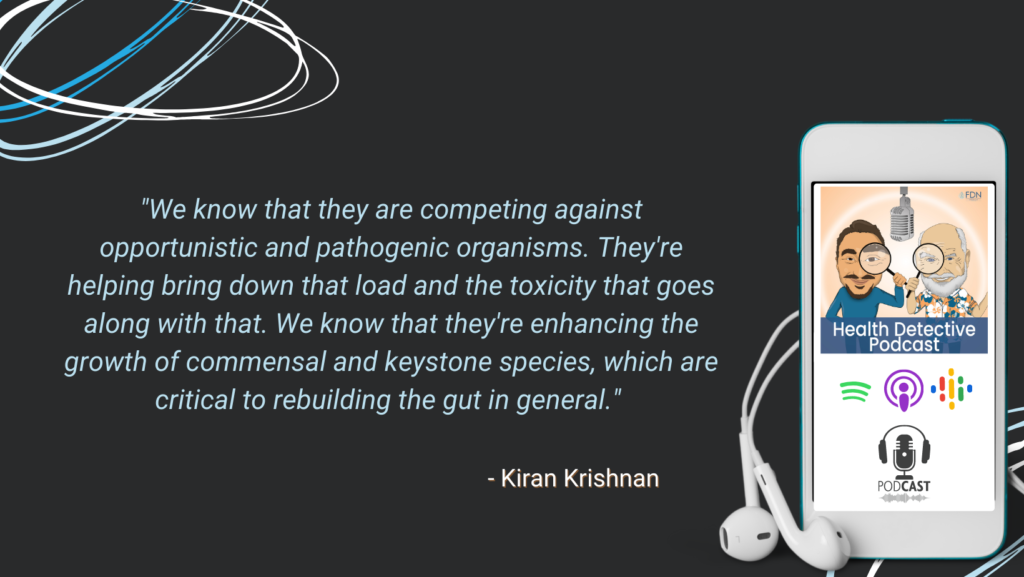
We started looking from a physiological standpoint or disease pathology standpoint, where are the big gaps in how we are dealing with people’s gut issues and then thereby systemic issues? We introduced the spores and know very well what the spores are doing in the gut. They are competing against opportunistic and pathogenic organisms. They’re helping bring down that load and the toxicity that goes along with that. We know that they’re enhancing the growth of commensal and keystone species, which are critical to rebuilding the gut in general.
Dysbiotic Gut, Leaky Gut, Chronic Illnesses
We also know that they produce things like short-chain fatty acids, lactic acid, other beneficial byproducts that support a healthy gut. That started becoming a really good picture on its own. But as we started digging into disease pathology, we started seeing that we were missing some steps for people that really wanted to restore their gut.
People like your mom, for example, which actually represents the majority of people that have had multiple courses of antibiotics, may have had parts of their system removed, whether it’s their gallbladder, had resections of the bowel, even having your tonsils removed at some point.
People that have had poor food choices and lifestyle choices for years on end, that’s just the average American, unfortunately. Then we continue to feed the American, the standard American diet. We end up with what we call the standard American gut, which is a severely dysbiotic gut, meaning this low diversity, low levels of keystone species, and high levels of opportunistic organisms, which may or may not be driving a huge problem, but certainly not helping the individual at all.
A consequence of that is that mucosal layer in the digestive tract becomes diminished significantly. It gets eaten away and it’s not functioning the way it’s supposed to. Then eventually the intestinal epithelial cells, the one that the mucosal layer is supposed to be protecting, that the beneficial microbes are supposed to be protecting as well, that intestinal epithelial layer gets damaged over time and becomes leaky and dysfunctional.

We then started looking at what kind of conditions does this standard American gut drive. Come to find out, when you look through all the literature and map out all the pathology, this kind of standard American gut dysfunction drives the vast majority of chronic illnesses.
Fixing the Gut Using Spore-based Probiotics & Prebiotics
I used to get this question very commonly, like seven, eight years ago from practitioners. It’s like, how do I know what’s wrong with my patient’s gut who has diabetes, versus my patient’s gut who has allergies, versus my patient’s gut who has anxiety. These are three seemingly unrelated conditions that affect different parts of the body and affect patients in a different way.
A trained practitioner knows that the microbiome plays a role in all of these, but what’s hard for them to understand is what is wrong in each of those guts and what to do about each one then. Like, how do I treat my autoimmune gut versus my anxiety gut? The answer is you actually treat them the exact same way, cause it’s the same issue in all of those conditions that drives their conditions. It’s an underlying driver of chronic low-grade inflammation.
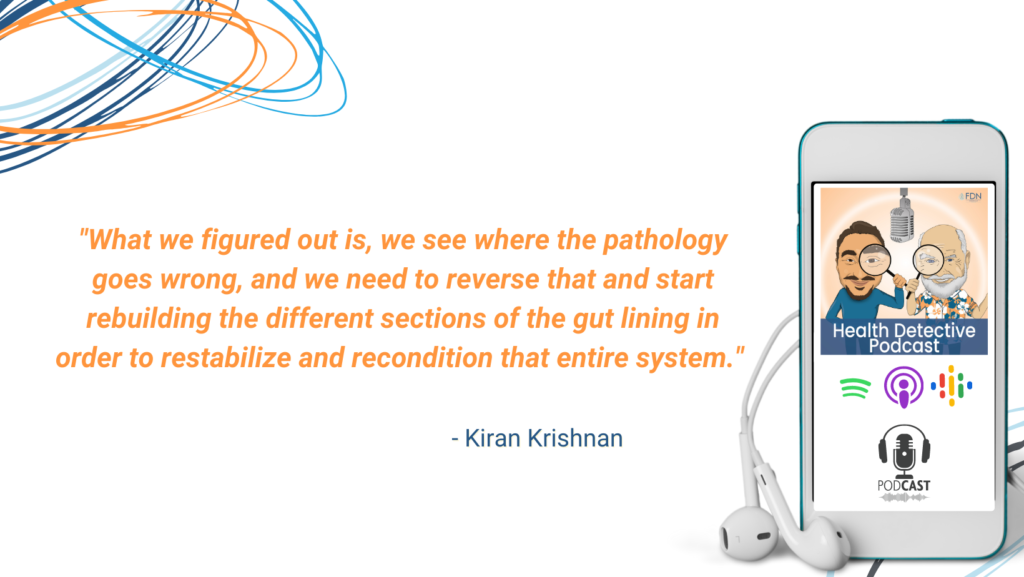
What we figured out is, we see where the pathology goes wrong, and we need to reverse that and start rebuilding the different sections of the gut lining in order to restabilize and recondition that entire system. It takes first a fixing of the microbiome, which is through the MegaSpore. The MegaSpore, as I mentioned, competes with the bad ones, increases the good ones, increases keystone species, starts a production of short-chain fatty acids going up.
The second step is we need to reinforce this new microbiome the individual is seeing. We needed to create these new prebiotics, but oligosaccharides that were highly specific to feed keystone species. That was the whole idea behind it.
The Total Gut Restore – Rebuilding and Reversing Damage
So, we came up with this mega pre-product that has these oligosaccharides clinically shown to feed keystone species. Now you’re starting to regrow the bacteria that actually rebuild the gut lining. Then we give that new bacteria and the third step, all the tools that they need to rebuild the gut mucosa in the lining, which are four critical amino acids, polyphenols, and then IgG as well.

When you look at just those three components, they each have studies on their own. Then we’ve done a study on them combined to show that they become the essential building blocks of that entire gut barrier structure. So, the Total Gut Restoration is really a way of looking at the most predominant dysfunction in the standard American gut and in a very systematic way of rebuilding it and reversing that damage. It’s applicable for virtually everybody that an FDN would see.
[00:39:37] Detective Ev: I’m so excited because I started a light therapy studio where I do some functional medicine stuff this past year. Now we literally started in March. I live in Pennsylvania. So, you get it. Chicago, right? Like terrible in the winter.
I really wanted this to be open just nine months out of the year, but we’re like, let’s give it a go. So, as the fall comes, I wanted to stack my place with supplements. I got the wholesale thing, and I’m so excited to be offering our people the Total Gut Restore thing. It’s going to be like on the shelves, literally selling it to people in there, including it in membership.
Working on the Foundational Dysfunction and Other Aspects
We do a lot of testing here and I do think that our practitioners are trained very well. I do believe there can be some nuances in how the gut is addressed. Mostly depending on the pathogenic type of bacteria or parasites even, that they’ve gotten in there.
If someone has blasto, I do think we can lessen it, but sometimes it’s helpful to get it out. I’m not here to debate that anyway. Total Gut Restore is absolutely going. I’ve never had it given to someone that it didn’t help, that’s for sure.
[00:40:26] Kiran Krishnan: Yeah. And you can absolutely bolt on other therapies to it.
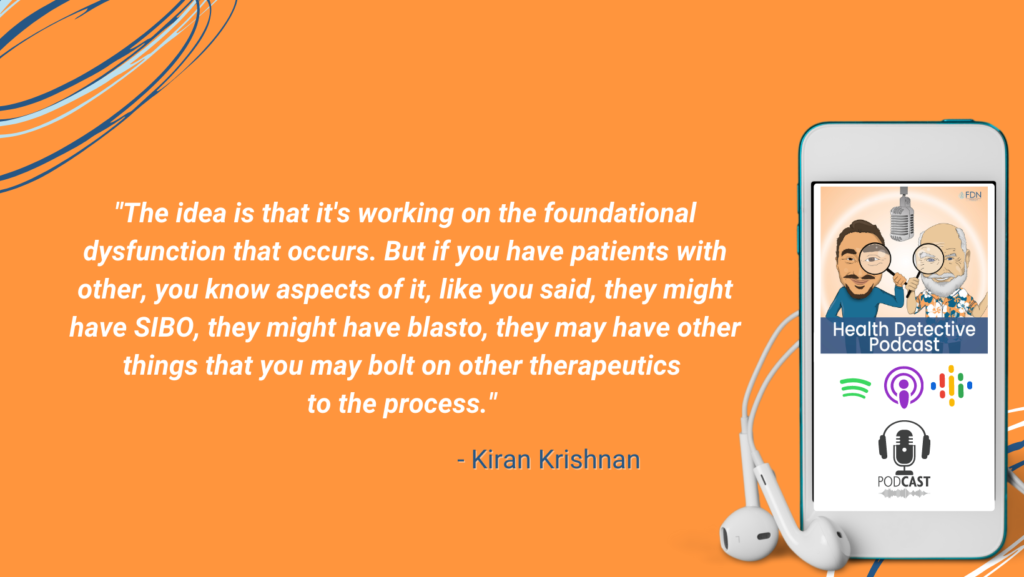
The idea is that it’s working on the foundational dysfunction that occurs. But if you have patients with other, you know aspects of it, like you said, they might have SIBO, they might have blasto, they may have other things that you may bolt on other therapeutics to the process. That totally works as well.
We have, for example, patients with really bad candida that we will put them on the Total Gut Restoration, but we’ll add in antifungals as well, to parts of it. You can absolutely play with it. It just becomes foundational and then you can add on to it as needed for the patient.
Total Gut Restore – Fundamentally, Good for All
[00:41:01] Detective Ev: It seems simple, but I appreciate you specifying that because our trainees might be new to this world. You didn’t mean it this way, but when they hear the Total Gut Restoration, all of these things, all those conditions you mentioned can be addressed the same.

They might be like, well, wait a second. Aren’t we supposed to be testing and looking at different things? So that’s where the line gets drawn, guys. What we’re saying here is the Total Gut Restore, fundamentally, is going to be good for everyone. But yes, there might be these small little differences. And, right, candida or a parasite or whatever, we can add on things, but TGR is going to be something that’s pretty solid for everyone.
Now, one thing that always comes up with our practitioners and I understand that there’s probably some legality behind this, so I’ll word this correctly. In the second phase of TGR, the prebiotics, you have something on the bottom that says this contains corn and dairy. Now, I am sensitive to both. It has never bothered me.
Hypothetically, let’s say you had a corn and dairy sensitivity, would you hypothetically be worried about that? Again, I know that you guys have to put that legally on, but people don’t understand that that doesn’t necessarily mean there’s the proteins in this product. Would you be worried about that if you had sensitivities to those things?
Safe for Dairy and Corn Sensitive People
[00:42:04] Kiran Krishnan: No, not at all. The reason for that is because the proteins aren’t present in there. Only one of the oligosaccharides does come from dairy, but, when you separate out the carbohydrate component from the protein component, you actually remove all of the casein and caseinates and all the things that actually cause the dairy sensitivity.
Then you isolate these really complex carbohydrate structures. Then it’s purified, goes through all kinds of filtration and so on. Carbohydrates and proteins separate very easily cause their molecular weights and all that are very different. So there isn’t any in there, but from a legal standpoint, as you mentioned, you have to mention the origin side of it.
The corn side is another thing. The xylooligosaccharides, which is actually a really amazing product and ingredient even on its own. I think there are maybe nine published studies on just that ingredient alone, not including our studies on the combined ingredients, comes from the inner corn cob.
So again, there’s no corn proteins or anything in there. It comes from the cob on the inside, where there are these small amounts of very resistant starches that are loaded with these oligosaccharides. There is no risk for sensitive people. Thousands upon thousands of sensitive people use it all the time.
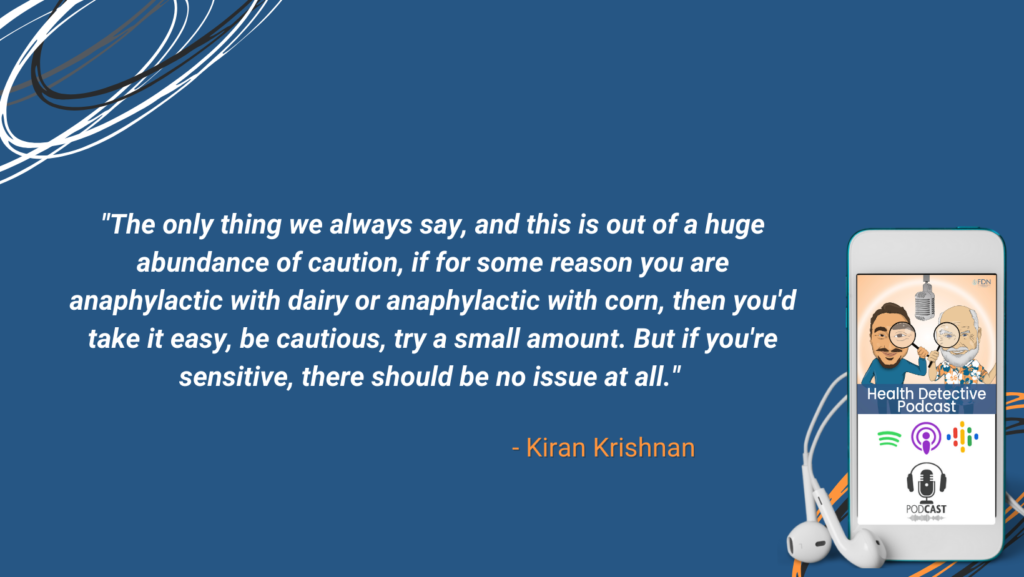
The only thing we always say, and this is out of a huge abundance of caution, if for some reason you are anaphylactic with dairy or anaphylactic with corn, then you’d take it easy, be cautious, try a small amount. But if you’re sensitive, there should be no issue at all.
Necessary, But Counterproductive Labeling
[00:43:28] Detective Ev: That’s the explanation I’ve been looking for for five years I did get this from a rep one time, and they explained it well. But it’s just cool to hear it from you. Because inevitably our trainees, the new people, they haven’t done this yet. They go through, oh, Microbiome Labs, this is great! Whoa, Total Gut Restore. It’s the first thing that they’re attracted to and they do it.
Then they say, wait a second, corn and dairy. Like, we don’t do that. I’m like, guys, you got to think a little bit outside the box. You really think that they would be putting that just directly in?
This is one of those times where, I’m all for labeling of like GMOs and all these things, but it’s one of those times where labeling probably is actually not so helpful.
Kiran Krishnan: It’s counterproductive.
Detective Ev: Yes, thank you. It’s a bit misleading.
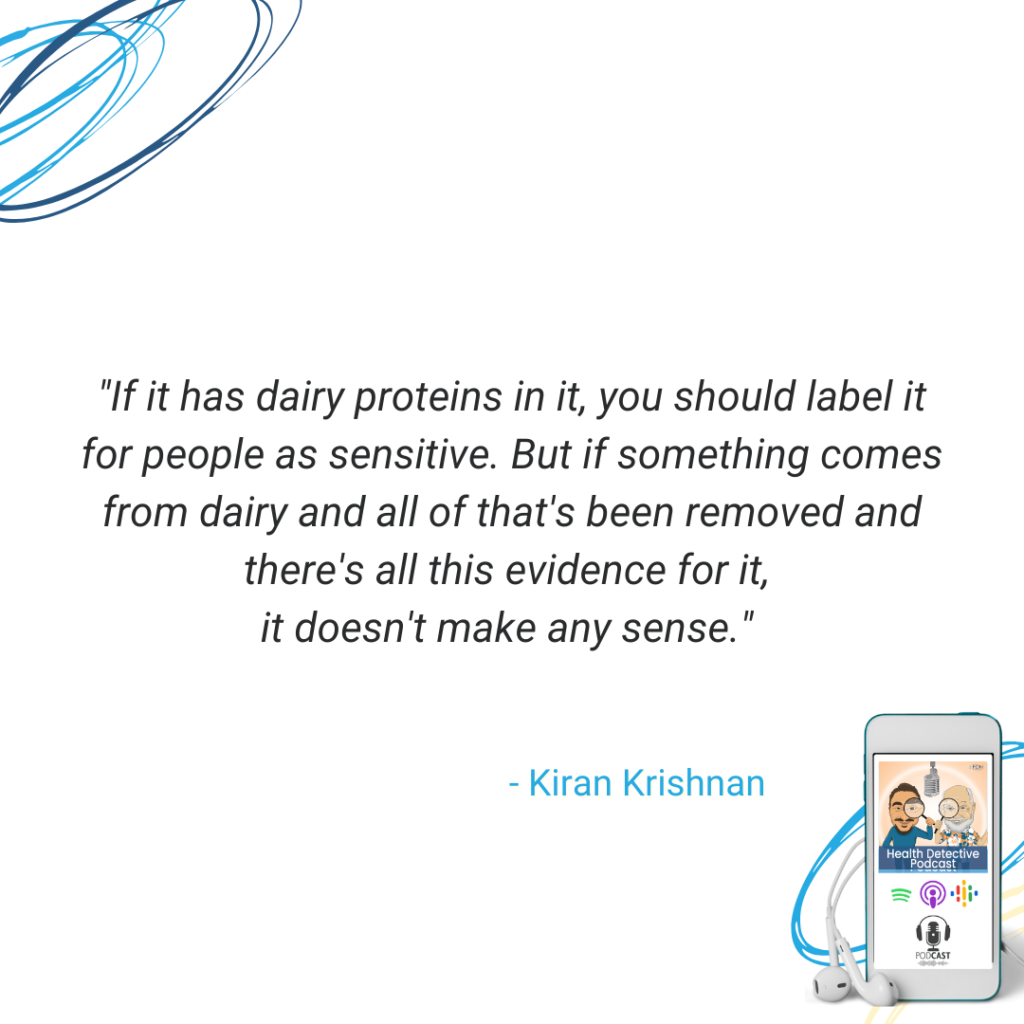
[00:44:01] Kiran Krishnan: If it has dairy proteins in it, you should label it for people as sensitive. But if something comes from dairy and all of that’s been removed and there’s all this evidence for it, it doesn’t make any sense. But yeah.
[00:44:14] Detective Ev: Well, we got a few minutes left. So, one thing I just want to ask, and I know that you guys are always working on something, it seems. I can’t believe the amount that you’re buffing out now. I mean, every time I go to the website, there’s something new and something really cool.
Maybe I should word it as, to the degree that you’re able to share, is there anything that you guys are working on right now that you’re super excited about?
New Microbiome Labs Products
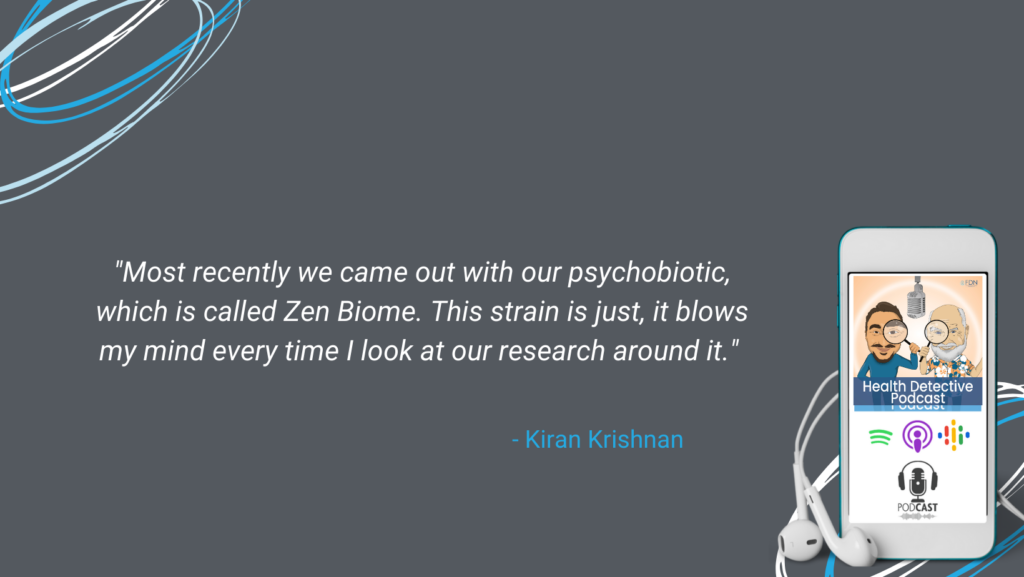
[00:44:31] Kiran Krishnan: There’s a number of things. Most recently we came out with our psychobiotic, which is called Zen Biome. This strain is just, it blows my mind every time I look at our research around it. We’ve got eight published studies on it, reducing cortisol, reducing perception of stress, improving mood significantly, and as well as improving sleep. It also changes brain wave function, which is just mind boggling.
This microbe can bind to receptors in your gut, shoot neurotransmitters up to your brain and put you in more of a theta wave band, which is the type of band that we’re trying to get to through meditation practices and mind/body practices and so on. It’s amazing that this probiotic can do that.
We’re coming out with a product that has a cousin to that strain, which is also a bifida bacterium. It is also an exopolysaccharide strain, which is what makes it unique. But this species has around 10 studies on it on IBS symptomology – controlling the crazy peristaltic activity, the jumps in the bowel, the irritability of the bowel through utilizing this bacteria. It does it through controlling inflammatory response and neurological response in the gut.
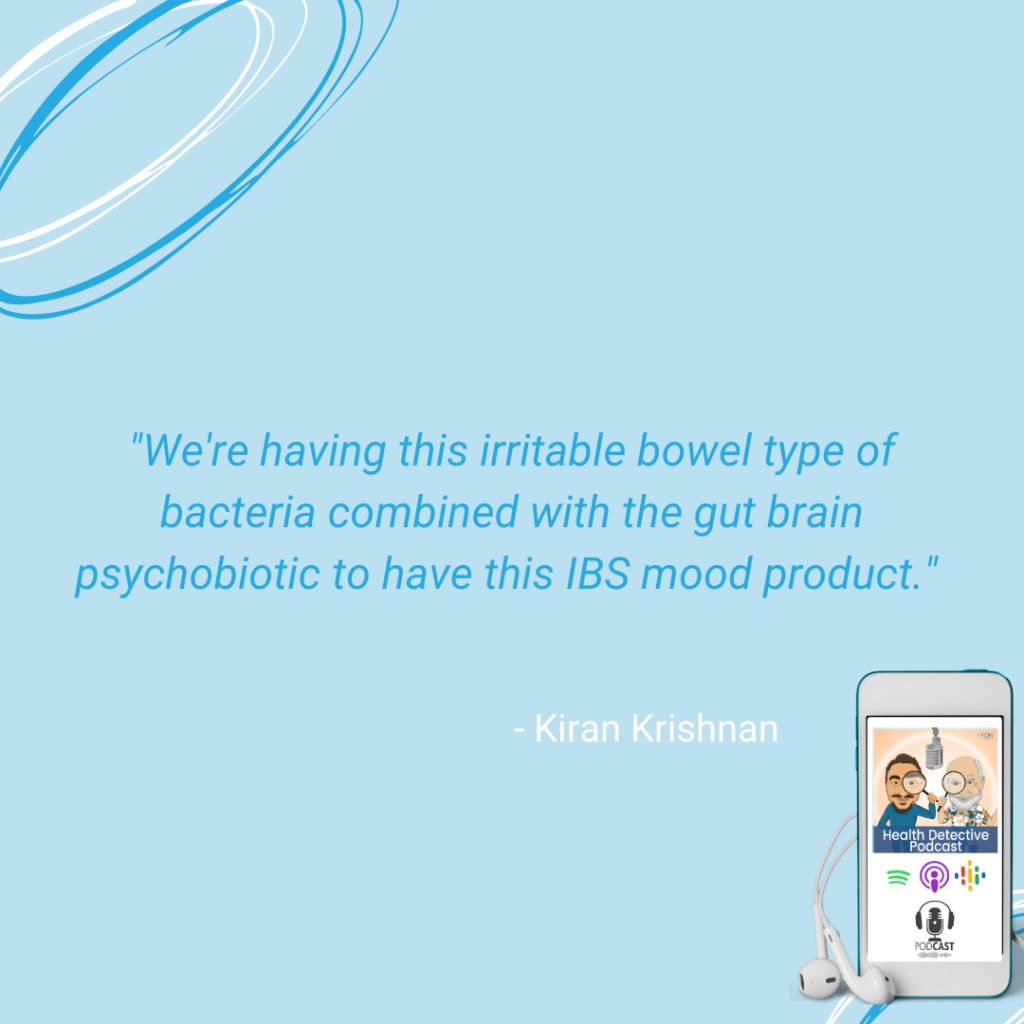
What we’re doing is we’re combining the two. We’re having this irritable bowel type of bacteria combined with the gut brain psychobiotic to have this IBS mood product. The reason for that is when you look at these statistics around 52% to 55% of people with IBS have confirmed anxiety when you compare that to the regular population of less than 19% of age match individuals.
Powerful Product for Mental Health Issues
Which means that if you have IBS, you’re almost two and a half times more likely to have some degree of anxiety as well, they go hand in hand. So, with the two strains, we’re actually doing a one, two punch under two dysfunctions that are related, but yet slightly different to be able to help with people who struggle with GI distress like that, who also have anxiousness to tackle both of those with one fell swoop.
That’s super exciting to us to be able to do that. And combined they have 18-something published studies together. It’s a lot of science behind it. That’s one of the very exciting ones coming out.
[00:46:40] Detective Ev: Awesome man! I had physical health stuff, and don’t get me wrong, that was serious. But my main story, one of the things that got me into functional medicine, Kiran, was severe mental health issues from about 5 to 19, 20 years old. It was pretty serious stuff, you know. I didn’t graduate high school, I’m pretty transparent about it.
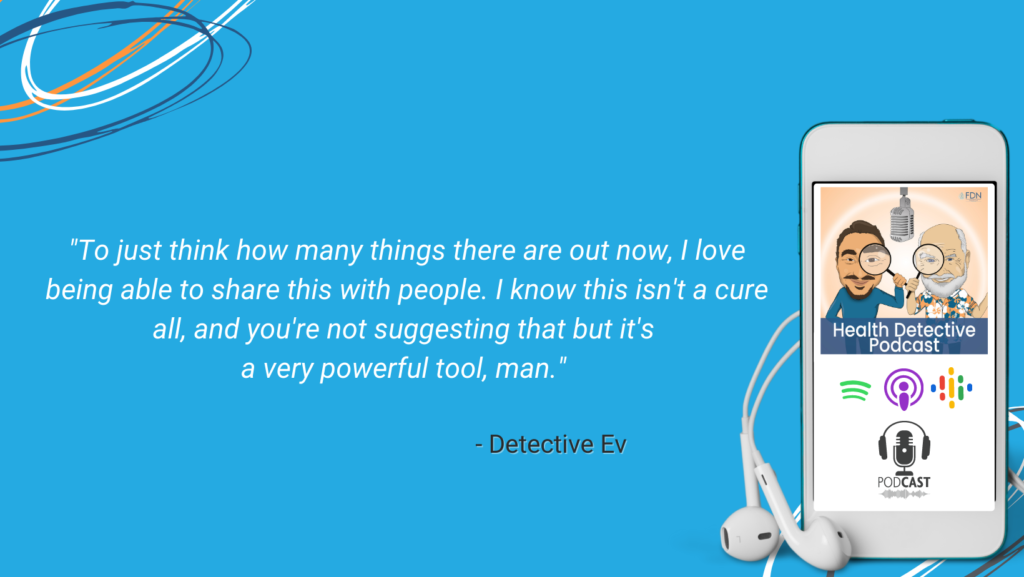
To just think how many things there are out now, I love being able to share this with people. I know this isn’t a cure all, and you’re not suggesting that but it’s a very powerful tool, man. And one of the ways that I always try to connect this idea for people, because some people, they believe me, they believe my story. But they’re a little skeptical when I say, well, I don’t take any medications for this stuff anymore. And I haven’t dealt with a panic attack in six years. Like I don’t deal with it. They’re like, come on. Really?
What FDN Trainees Can Do
I actually referenced that exact same thing that you just talked about with the IBS, because correlations not causation, I get that. But my God, come on. Like sometimes you got to look at something and say, this is pointing in a certain direction. We need to use our heads a little bit. So, I digress.
I appreciate you bringing that up and maybe I should try that product, even though I feel good. It’d still be kind of cool. I’ve never tried that one.
All right. So, for trainees out there that are thinking about, cause I’m going to ask you now where to get these things.

For trainees, what you’re going to want to do is get connected with your FDN mentor. All right. Talk to them and they will show you at some point how to get connected with all these accounts after you’re graduated. Then you’ll be able to get hooked up with Microbiome Labs.
Now, of course, we also have consumers that listen, Kiran, and that are just really interested in health. They’ll probably never be an FDN. Maybe they’ll work with one, but they might not be one. So, if I’m a consumer, I’m really interested in this. I’m like, wow, this guy knew his stuff. Where can I get these products as a consumer? What’s the best way to do that?
Where to Find Microbiome Labs Products & Kiran Krishnan
[00:48:05] Kiran Krishnan: Yeah. I know if you just do a Google search, a lot of our clinicians, our FDN partners, do sell the product on their websites. You can gain access from them at a retail value.
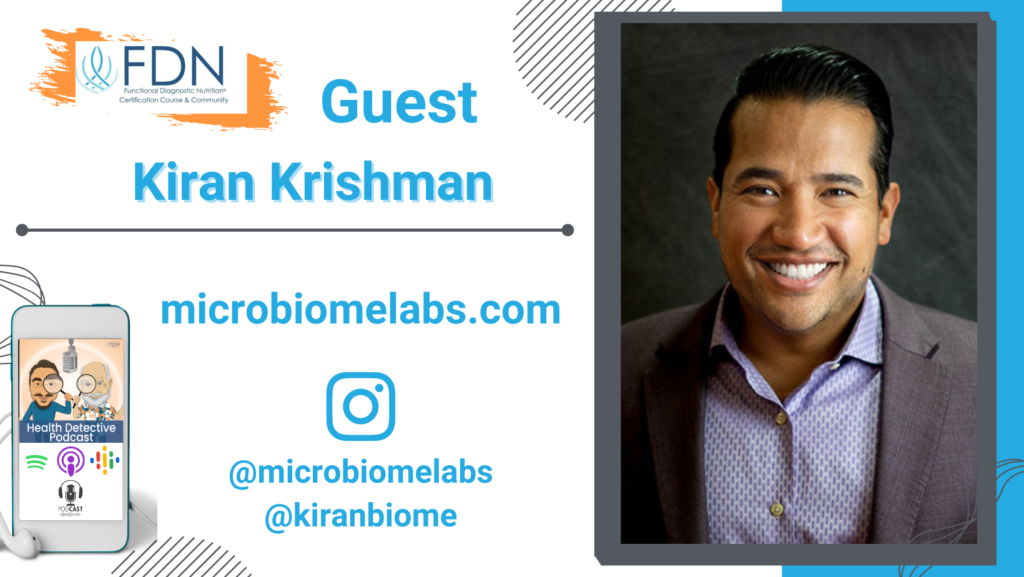
You can also come to our website, which is microbiomelabs.com. There is a find a practitioner portal on there where you can put in your zip code, and it’ll list for you all the practitioners that have opted to list their practices and connect information in order for you to be able to understand and access the products through them as well.
So, just do a Google search and/or come to our website and put in your zip code. very
[00:48:38] Detective Ev: I highly encourage the “find a practitioner” thing, guys, solely because there’s going to be people out there that might be smaller time people and you’re supporting them and supporting the company. I think that’s a very cool feature that you have.
Now, Kiran, do you have social media personally where people can follow you?
[00:48:50] Kiran Krishnan: Oh, sure. Yeah. You know, I try to engage with people as much as I can on social media, cause if I can provide anyone direction for their health, I’m happy to do that. I don’t see clients, of course, but I’m happy to point them in the direction of science.
My Instagram handle is kiranbiome, so K I R A N B I O M E. And on Facebook you can reach me at kirankrishnan. I think if you just type that in, you’ll see it. So yeah, please do try to reach out. I try to engage as much as I can.
Microbiome Labs on Instagram – click here
Health Detective Podcast Signature Question – Take Researched, Spore-based Probiotics
[00:49:15] Detective Ev: The signature question to wrap up is if we could give Kiran a magic wand and you could get every single person in this world to do one thing for their health or stop doing one thing, what is the one thing that Kiran would get them to do?
[00:49:30] Kiran Krishnan: Oh that’s a great question. This might sound biased, but I would genuinely have them take a researched, spore-based probiotic. I think the impact that these microbes have on your system keep surprising us. You know, every time we look at it, every time we do a new study, it just baffles us the kinds of impact that they can make on your system.
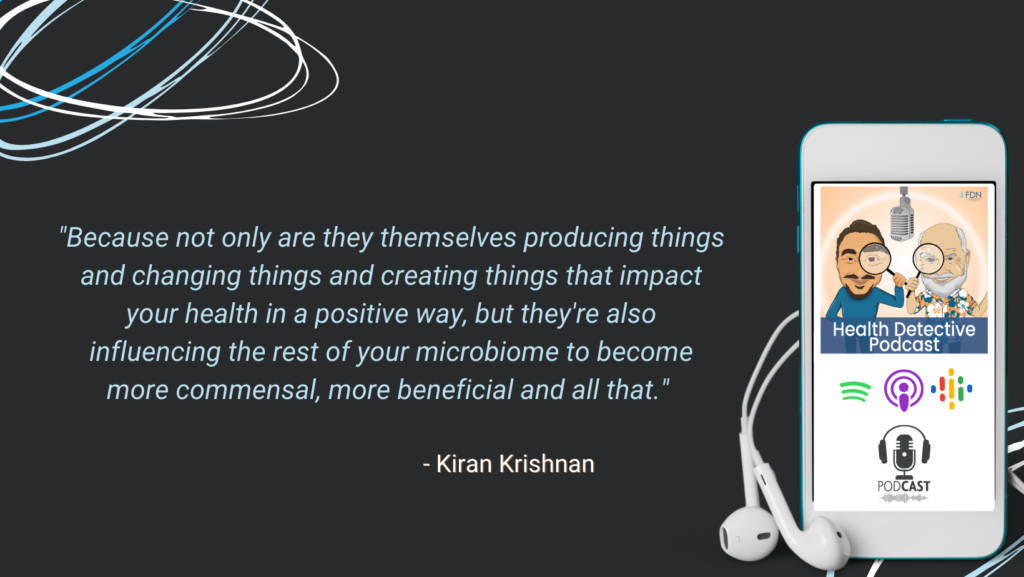
Because not only are they themselves producing things and changing things and creating things that impact your health in a positive way, but they’re also influencing the rest of your microbiome to become more commensal, more beneficial and all that. That can be a sea of change for people with their health. Although it seems biased, that’s one thing I would do.
The second thing that I would ask them to stop doing is, stop getting misguided information on health. One of the unfortunate things about the internet is that anyone can be on there talking about anything, giving any kind of advice. More often than not, people who are qualified, people who have the background, who understand science and health and so on are trying to undo misinformation that people have been baked into their brains.
Stop Getting Misguided Information on Health

So, follow somebody who’s trained, follow an FDN, right? Follow a nutritionist, follow a RD or doctor of some sort that seems to be trained in the field. Have a little bit more discernment about whose information you look at. Then try to get all your supplement advice and knowledge from people who know how to vet this stuff.
That’s one of the one reasons why we love working with the practitioner community, because we think most people should be buying their supplements through practitioners. We don’t want you to waste your time or take the wrong thing and maybe take something that’s unsafe or get one of those a hundred billion, CFU probiotics in the refrigerator, that’s just going to die in your stomach anyway. You’re just wasting your time.
So, listen to programs like this. Share programs like this with people you know so that people can get really good, vetted information.
Conclusion
[00:51:31] Detective Ev: All right guys. Well, that’ll do it for today’s episode with Kiran Krishnan co-founder of Microbiome Labs and microbiologists himself. If you’re interested in following him, you already know where to go. You can check the show notes and we will have the links there in case you forgot.
And if you’re interested in pursuing the FDN course, go to fdntraining.com/tryfdn.
Finally, if you enjoy this information that we’re sharing, all these episodes twice a week, so consistently, we would greatly appreciate a review on Apple podcasts. Leave us a five-star there and Spotify as well.
It is so funny. You guys are amazing, I’m not complaining. But Apple has all these great reviews and then Spotify has nothing.
People are going to think that no one listens to this thing. So, I don’t know how that has happened over time, but we would love it if you left us a review on Spotify as well. Please and thank you.
I am looking forward to talking you guys again soon. I will be back again with another interview. But until then, please take care.
You can always visit us at functionaldiagnosticnutrition.com.
Need to hire a coach, click here to visit FDNthrive. Click here for a Free Health Review.





